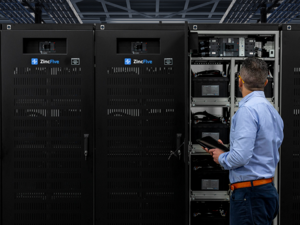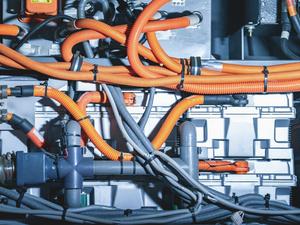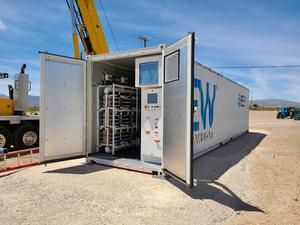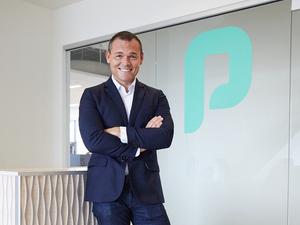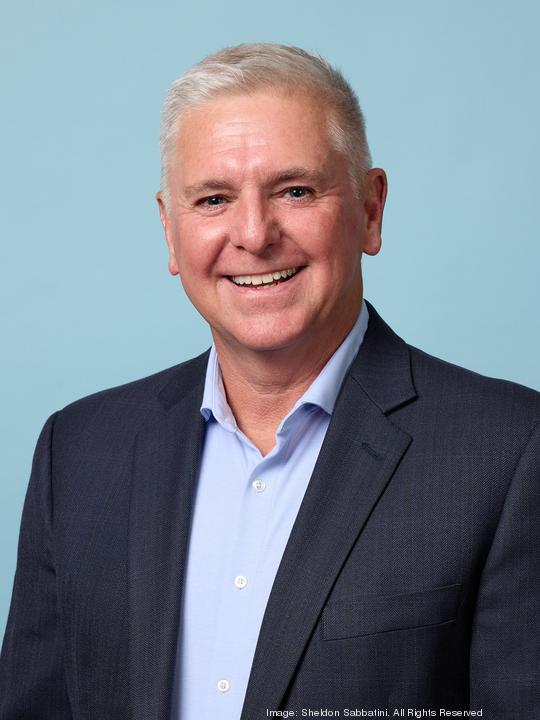
ZincFive CEO Tim Hysell declined to reveal the valuation set for the Tualatin battery startup in a recent $54 million Series D funding round. But it could be a moving target anyway.
“There are some really significant things that could happen to us, in as early as 2023,” Hysell said in an interview. “If those come to fruition, then we’re going to have to have some real professionals put a valuation on ZincFive, because it’s going to change notably.”
The company, founded in 2015, makes rechargeable nickel-zinc battery systems that play in a category known as uninterruptible power supply, or UPS. After gaining early sales in traffic-control applications, ZincFive is hitting its stride with products aimed at data centers, where its batteries kick in immediately when power fails and run until onsite generators take over.
“We’re approaching $100 million in purchase orders in 2022 alone in the data center industry,” Hysell said, “and that’s for a product that we just launched late last year.”
The finance calculus
The data center inroads, where the company competes with lithium-ion and lead-acid batteries, is shifting the finance calculus for ZincFive.
“We get asked all the time if we’re we going to pursue the public markets,” Hysell said. “I’ve always told people that to be in the public market you have to have predictable quarter-over-quarter revenue. A year ago, I couldn’t tell you we had that. We had revenue, but it wasn’t something I could with confidence predict.”
Now he can. Hysell didn’t get into whether that means a public play might be in ZincFive’s future, but did say investors have welcomed the maturity the company offers.
“It’s refreshing for the finance world to hear from us that we have high-volume battery manufacturing already,” Hysell said. “We don’t have to cross that chasm to prove we can do that — we’ve done that.”
Several nickel-zinc traits are driving the success in data centers, Hysell said. One is “low impedance,” the ability to execute high-power discharge. This allows for a smaller battery footprint. Cooling and fire suppression costs are also lower than with alternative chemistries that can overheat with high-power discharge.
ZincFive also makes a claim to being the green option, partly because greenhouse gas emissions tied to sourcing nickel and zinc are lower than for lithium and lead, and also because far less water is needed for material extraction and production. The nickel-zinc batteries also boast high recyclability.
U.S. manufacturing
ZincFive batteries are manufactured in China, home to about half of its 185-person workforce (Hysell said the company plans to add at least 60 U.S. jobs in 2023). One plan with the new funding is to build accretive manufacturing capacity in the U.S. by late 2023 or early 2024.
“Some of our larger customers, some of the corporations that we’re doing business with, they would really like us to be manufacturing our batteries and some of our products here in the U.S.,” Hysell said.
They’re eager to see ZincFive pass along benefits from the Inflation Reduction Act, which offers incentives for domestic battery manufacturing. One provision provides an additional 10% tax credit for products made in plants located in an “Energy Community,” which includes areas where a coal mine or coal-fired power plant has closed.
“We’ll be looking very, very closely at that program where you stand up manufacturing facilities in a coal zone,” Hysell said.
